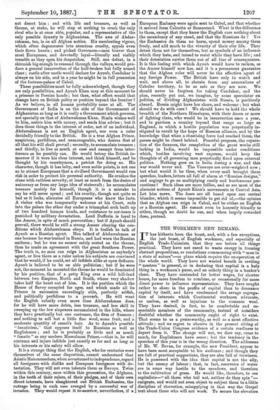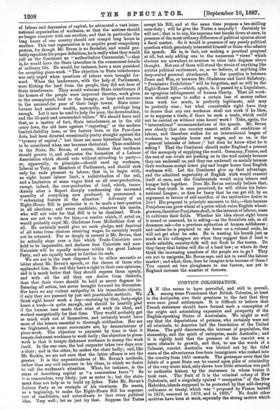THE WORKMEN'S NEW DEMAND.
IT has hitherto been the boast, and, with a few exceptions, the just boast, of English workmen, and especially of English Trade-Unionists, that they are before all things practical. They have not oared to waste energy in framing abstract propositions, or resolutions commencing with " man in
a state of nature"—or plans which require the co-operation of the whole world. They have not wasted breath in reviling
" masters " in general, or in declaring that capital is a holy thing in a workman's purse, and an unholy thing in a banker's chest. They have contended for better wages, for shorter hours, for more freedom to combine, or occasionally for more direct power to influence representation. They have sought rather to share in the profits of capital than to denounce capital by itself, and have condemned the savage segrega- tion of interests which Continental workmen advocate, as useless, as well as injurious to the common weal. They have desired, in fact, to be comfortable and re- spectable members of the community, instead of outsiders doubtful whether the community ought of right to exist. That seems to us a praiseworthy, as well as a most effective attitude ; and we regret to observe in the present sitting of the Trade-Union Congress evidence of a certain readiness to depart from it. The change will not, we dare say, corns to much, for Englishmen have sense ; but the tendency in the speeches of this year is in the wrong direction. The addresses of Mr. W. Bevan, for example, the new President, appear to have been most acceptable to his audience; and though they are fall of practical sagged-ions, they are also full of viewiness. He is possessed with the idea that capital is not the ally, but the enemy of labour ; that, in fact, reservoirs of water are in some way hostile to the meadows, and therefore to the cultivation of grass. He would like, therefore, to see capitalists—" all those who toil not, neither do they spin "- emigrate, and would not even object to subject them to a little discipline of starvation, misapplying in that way the Gospel text about those who will not work. To secure the elevation
of labour and depression of capital, he advocated a vast inter- national organisation of workmen, so that the nations should no longer compete with one another, and that in particular the long hours of one country should not compel long hours in another. This vast organisation is to acquire great compulsory powers, for though Mr. Bevan is no Socialist, and would pro- bably repudiate his proper definition, he is really what they would call on the Continent an "authoritative Communist,"—that is, he would have the State interefere in the commonest details of ordinary life. He would, for instance, have a man punished for accepting piece-work. "The objection to State interference was only urged when questions of labour were brought for- ward. When the landowners, with the help of Parliament, were filching the land from the people, they did not hear of State interference. They would welcome State interference if the homes of the people were improved thereby, work given to the unemployed, food to the hungry, or hope and succour to the uncared-for poor of their large towns. State inter- ference had assisted wealth, monopoly, and privilege long enough. Let it now be used to help the poor, the downtrodden, and the ill-paid and overworked toilers." We should have said that, as a matter of fact, State interference, as in the old usury laws, the old laws against " regratine or the modem limited-liability laws, or the factory laws, or the Poor-Law Acts, had been directed occasionally pretty straight against the " tyranny of capital ;" but those are mere historical facts, not to be considered when one becomes rhetorical. Thus confident in the State, Mr. Bevan, of course, desires that workmen should govern it, and advocates the formation of a Labour Association which should vote without attending to party— or, apparently, to principle—should send up workmen, Liberal or Tory, as Members of Parliament, and should seek only for ends pleasant to labour, that is, to begin with, an eight hours' labour limit, a redistribution of the soil, and a limitation of some vague kind on all over-production, except, indeed, the over-production of food, which, imme- diately after a Report sharply condemning the increased quantity of everything now produced, is pronounced a " redeeming feature in the situation." Advocacy of an Eight-Hours Bill in particular is to be made a test-question at all elections ; and every candidate, whatever his merits, who will not vote for that Bill is to be dismissed. Work- men are not to vote for him,—a resolve which, if acted on, would probably expel Mr. Gladstone from Midlothian first of all. He certainly would give no such pledge, and deprived of all votes from electors receiving wages, he certainly would not be returned. For so deeply in earnest is Mr. Bevan, that he actually steps over a line which Trade-Unionists once held to be impassable, and declares that Unionists and non- Unionists will be equally welcome within the great Labour Party, and are equally bound to further its ends. We are not in the least disposed to be either sarcastic or bitter about Mr. Bevan's speech, or the cheers of those who applauded him. He and they have a right to their own opinions, and it is much better that they should express them openly, and with all the aid they can derive from rhetoric, than that their views should be held as secret dogmas in- fluencing all action, but never brought forward for discussion. Nor have we any violent antipathy to his immediate objects, if only they are pursued by just and practicable methods. We think eight hours' work a day—meaning by that, forty-eight hours a week—is quite enough, and should be heartily glad if the human race made that stint of work its ideal, and worked energetically for that time. They would probably get as much work out of themselves, and certainly would have more of the leisure essential to thorough civilisation. Nor are we frightened, as some economists are, by denunciations of piece-work. The objection to payment by time is that it tempts dishonest workmen to work lazily ; the objection to piece- work is that it tempts dishonest workmen to scamp the work itself. In the one case, the bad carpenter takes two days over a chair; and in the other, he makes the chair badly; and, like Mr. Ruskin, we are not sure that the latter offence is not the greater. It is the unpracticalnees of Mr. Bevan's methods, rather than any evil inherent in his ideas, to which we desire to call the workmen's attention. What, for instance, is the sense of describing capital as "a remorseless force"? So it is remorseless, very likely, just as water is ; but the state- ment does not help us to build up dykes. Take Mr. Bevan's Labour Party as an example of his viewinees. He wants, as a beginning, to make the Eight-Hours Bill his supreme test of candidates, and subordinate to that every political idea. Very well ; let us just try that. Suppose the Tories accept his Bill, and at the same time propose a ten-shilling corn-duty ; will he give the Tories a majority ? Certainly he will not ; that is to say, his supreme test breaks down at once, in presence of the most ordinary difference of political opinion about a fiscal matter. So it would in presence of any purely political question which genuinely interested himself or those who admire his speech. He is, in fact, not making a practical proposal at all, but only adding one to the numerous " views " which electors are nowadays so anxious to raise into dogmas above thought. Not one of them will stand the strain of anything like serious political excitement, or, as we believe, of anything like deep-seated personal attachment. If the question is between Peace and War, or between Mr. Gladstone and Lord Salisbury, "Permissive Prohibition " will be forgotten, and so will be the Eight-Hours Bill,—which, again, is, if passed by a Legislature, an egregious infringement of human liberty. That all work- men should agree to suffer a certain loss of money rather than work too much, is perfectly legitimate, and may be perfectly wise ; but what conceivable right have they to decree that any one workman shall not work if he likes, or to suppress a trade, if there be such a trade, which could not be carried on without nine hours' work Take, again, the "international" recommendations of the speech. Mr. Bevan sees clearly that one country cannot settle all conditions of labour, and therefore wishes for an international league of workmen to regulate hours and wages, and so on, in the "general interests of labour ;" but does he know what he is asking ? That the Continent should make England a present of the monopoly of supplying the world. Germany, France, and the rest of our rivals are pushing us to the wall mainly because they can undersell us, and they can undersell us mainly because their workmen accept lower pay and longer hours than English workmen will. Let the Continent give up that advantage, and the admitted superiority of English work would reassert itself at once, and the Continentals would enjoy leisure and hunger both together. Does Mr. Bevan seriously believe that, when that troth is once perceived, he will obtain his Inter- national League ; or does he fancy that he can get rid, by an argument in favour of self-sacrifice, of the instinctive desire to live ? His proposal in principle amounts to this,—that because Punjabees can grow wheat at a price which ruins English wheat- gro were, therefore Punjabees shall, in the interest of labour, cease to cultivate their fields. Whether his idea about eight hours is sound or unsound, he is asking—as the Socialists ask, as all dreamers ask—for a previous extinction of human selfishness ; and unless he is prepared to use force on a colossal scale, he will not get what he asks. He is wasting his breath just as much as his colleagues are when they suggest that if land is made saleable, country-folk will not flock to the towns. Do they fancy that babies will die of a land law; or where do they think the increasing numbers of the people are to go I They are not to emigrate, Mr. Bevan says, and not to swell the labour market ; and what, then, does he imagine is to become of them ? You cannot set two ploughmen to one furrow, nor yet in England increase the number of furrows.



































 Previous page
Previous page